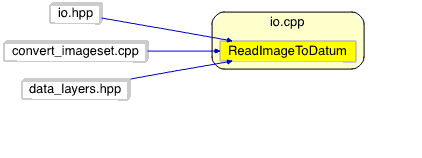Caffe 源码的修改(用于车辆的定位)
Caffe 源码的修改(用于车辆的定位)
主页 分类 标签 链接 关于修改后的caffe源码 https://gitcafe.com/lxiongh/Caffe_for_Multi-label
Caffe 的源码仅适用于模式分类问题,其标签是一维的。为了能够将 Caffe 代码应用于车辆的检测问题上,首先要解决的问题就是将 Caffe 源码中与标签相关的代码由一维改为多维。本项目由于只需预测车辆的上下两角的坐标(x1,y1, x2,y2),即将标签修改为4维。
这次能够很顺利的修改源码,很大一原因是实验室的师弟太给力了,他们对 Caffe 源码的研究开始地很早,并在以 Caffe 作为其深度学习的工具,并且在也发表了一些很不错的文章。Thanks to TianShui, LiangLi, JinZhu. 『车辆定位项目链接 http://lxiongh.github.io/2015/02/04/car_localization/』
首先,利用 Understanding 软件,可以方便的查看到 caffe 源码的目录结构,如下图所示。
可以注意到,在 Caffe 源码里有一个『Tools』的目录,里面有一些相当有用的工具,如『compute_image_mean.cpp』、『convert_imageset.cpp』等,其中『convert_imageset.cpp』直接操作到了文本文件,如下列代码所示。那么函数『ReadImageToDatum』将就是突破口。
1 // convert_imageset.cpp, line 129-
2 for (int line_id = 0; line_id < lines.size(); ++line_id) {
3 if (!ReadImageToDatum(root_folder + lines[line_id].first,
4 lines[line_id].second, resize_height, resize_width, is_color, &datum)) {
5 continue;
6 }
7 // ...
8 }定义在io.cpp里的函数ReadImageToDatum完成了将图片数据转换成caffe能够处理的Datum类型,主要修改的文件大都集中在数据层,将其单标签改成多标签支持。针对车辆检测,对caffe所作的修改有如下的部分:
caffe.proto
![]()
将
optional改为repeated,使得标签变量label为数组,即支持多标签。否则无此属性Datum.label_size()。
data_layer.hpp
将
lines_由protected修改为public,使得后续能够利用指针直接访问lines_数据,其中保存了图片名及其对应的标签信息。详见test_det_net.cpp
data_layer.cpp
修改
top_label,使得其保存图片的多标签信息。
image_data_layer.cpp
从文本文件里读取图片的路径及标签信息,将原来
int label修改成std::<vector> vec_label。同时需要特别注意的就是不要忘记申请相应的存储空间(*top)[1]->Reshape(this->...),否则在初始化网络时就会出现错误。
memory_data_layer.cpp
虽然这个在实际应用中没有用到,但因其涉及到最底层的数据层,所以也修改了。
io.hpp
io.cpp
这个文件涉及到最底层的数据读写工作。
test_det_net.cpp,由extract_feature.cpp修改而来的对输入的图片进行车辆预测,并画框输出
1 #include <stdio.h> // for snprintf
2 #include <string>
3 #include <vector>
4
5 #include "boost/algorithm/string.hpp"
6 #include "google/protobuf/text_format.h"
7 #include "leveldb/db.h"
8 #include "leveldb/write_batch.h"
9
10 #include "caffe/blob.hpp"
11 #include "caffe/common.hpp"
12 #include "caffe/net.hpp"
13 #include "caffe/proto/caffe.pb.h"
14 #include "caffe/util/io.hpp"
15 #include "caffe/vision_layers.hpp"
16
17 // liu
18 #include <opencv2/core/core.hpp>
19 #include <opencv2/highgui/highgui.hpp>
20 #include <opencv2/highgui/highgui_c.h>
21 #include <opencv2/imgproc/imgproc.hpp>
22 #include <opencv2/opencv.hpp>
23 #include <sys/stat.h> // for mkdir
24
25 using namespace caffe; // NOLINT(build/namespaces)
26
27 template<typename Dtype>
28 int feature_extraction_pipeline(int argc, char** argv);
29
30 int main(int argc, char** argv) {
31 return feature_extraction_pipeline<float>(argc, argv);
32 // return feature_extraction_pipeline<double>(argc, argv);
33 }
34
35 template<typename Dtype>
36 int feature_extraction_pipeline(int argc, char** argv) {
37 ::google::InitGoogleLogging(argv[0]);
38 const int num_required_args = 5;
39 if (argc < num_required_args) {
40 LOG(ERROR)<<
41 "This program takes in a trained network and an input data layer, and then"
42 " extract features of the input data produced by the net.\n"
43 "Usage: test_det_net pretrained_net_param"
44 " feature_extraction_proto_file num_mini_batches"
45 " output_dir"
46 " [CPU/GPU] [DEVICE_ID=0]\n"
47 "Note: the feature blob names is fixed as 'fc_8_det' in code\n";
48 return 1;
49 }
50 int arg_pos = num_required_args;
51
52 arg_pos = num_required_args;
53 if (argc > arg_pos && strcmp(argv[arg_pos], "GPU") == 0) {
54 LOG(ERROR)<< "Using GPU";
55 uint device_id = 0;
56 if (argc > arg_pos + 1) {
57 device_id = atoi(argv[arg_pos + 1]);
58 CHECK_GE(device_id, 0);
59 }
60 LOG(ERROR) << "Using Device_id=" << device_id;
61 Caffe::SetDevice(device_id);
62 Caffe::set_mode(Caffe::GPU);
63 } else {
64 LOG(ERROR) << "Using CPU";
65 Caffe::set_mode(Caffe::CPU);
66 }
67 Caffe::set_phase(Caffe::TEST);
68
69 arg_pos = 0; // the name of the executable
70 string pretrained_binary_proto(argv[++arg_pos]);
71
72 string feature_extraction_proto(argv[++arg_pos]);
73 shared_ptr<Net<Dtype> > feature_extraction_net(
74 new Net<Dtype>(feature_extraction_proto));
75 feature_extraction_net->CopyTrainedLayersFrom(pretrained_binary_proto);
76 // to get image_paths
77 const vector<shared_ptr<Layer<float> > > layers = feature_extraction_net->layers();
78 const caffe::ImageDataLayer<float> *image_layer = dynamic_cast<caffe::ImageDataLayer<float>* >(layers[0].get());
79 CHECK(image_layer);
80
81 const string blob_name = "fc_8_det";
82
83 CHECK(feature_extraction_net->has_blob(blob_name)) \
84 << "Unknown feature blob name " << blob_name \
85 << " in the network " << feature_extraction_proto;
86
87
88 int num_mini_batches = atoi(argv[++arg_pos]);
89 string output_dir = argv[++arg_pos];
90 CHECK_EQ(mkdir(output_dir.c_str(),0744), 0) << "mkdir " << output_dir << " failed";
91
92 LOG(ERROR)<< "Extracting Features";
93
94 vector<Blob<float>*> input_vec;
95 int image_index=0;
96 for (int batch_index = 0; batch_index < num_mini_batches; ++batch_index) {
97 feature_extraction_net->Forward(input_vec);
98
99 const shared_ptr<Blob<Dtype> > feature_blob = feature_extraction_net->blob_by_name(blob_name);
100
101 int batch_size = feature_blob->num();
102
103 int dim_features = feature_blob->count() / batch_size;
104 CHECK_EQ(dim_features, 4) << "the dim of feature is not equal to 4";
105
106 Dtype* feature_blob_data;
107 int x1, y1, x2, y2;
108 for (int n = 0; n < batch_size; ++n) {
109 feature_blob_data = feature_blob->mutable_cpu_data() + feature_blob->offset(n);
110
111 x1 = feature_blob_data[0];
112 y1 = feature_blob_data[1];
113 x2 = feature_blob_data[2];
114 y2 = feature_blob_data[3];
115
116 string image_path = image_layer->lines_[image_index].first;
117 //LOG(ERROR) << "image_index " << image_index << " " << image_path \
118 << " x1 " << feature_blob_data[0] << " y1 " << feature_blob_data[1] \
119 << " x2 " << feature_blob_data[2] << " y2 " << feature_blob_data[3];
120
121 cv::Mat img_origin = cv::imread(image_path);
122
123 std::vector<string> part_names;
124 boost::split(part_names, image_path, boost::is_any_of("/"));
125 string subname = part_names[part_names.size()-1]; // the last element is the image name.
126 string out_path(output_dir + "/" + subname);
127
128 //LOG(ERROR) << subname;
129 line(img_origin, cv::Point(x1, y1), cv::Point(x2, y1), cv::Scalar(0, 0, 255), 3);
130 line(img_origin, cv::Point(x2, y1), cv::Point(x2, y2), cv::Scalar(0, 0, 255), 3);
131 line(img_origin, cv::Point(x2, y2), cv::Point(x1, y2), cv::Scalar(0, 0, 255), 3);
132 line(img_origin, cv::Point(x1, y2), cv::Point(x1, y1), cv::Scalar(0, 0, 255), 3);
133 CHECK_EQ(imwrite(output_dir + "/" + subname, img_origin), true) << "write image " + out_path + " failed";
134
135 image_index ++ ;
136 if (image_index>=image_layer->lines_.size()){
137 LOG(ERROR) << "Restarting data prefetching from start.";
138 image_index = 0;
139 }
140 // (image_index>image_layer->lines_.size()-1)?(image_index=0):(image_index++);
141 }
142
143 } // for (int batch_index = 0; batch_index < num_mini_batches; ++batch_index)
144 // write the last batch
145
146 LOG(ERROR)<< "Successfully extracted the features!";
147 return 0;
148 }









